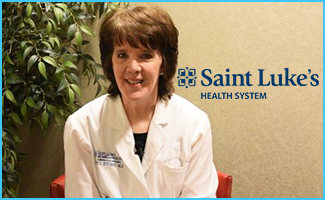
Women have long impacted medicine, clinical research, and healthcare, but only recently have gender differences in disease been a driver towards change. Dr. Tracy Stevens, Cardiologist and Medical Director of Saint Luke’s Muriel I. Kauffman Women’s Heart Center focuses on empowering women about their cardiovascular health.
Heart disease and stroke kill more women than all forms of cancer combined, yet most modern coronary treatment is based on research studies where women were underrepresented or absent. This is because experts used to believe that this was just a disease for men, but now they recognize that there are symptom differences in women’s heart attacks or heart conditions versus men’s. Specifically, there are unique heart conditions that happen predominately in women. One of them is Spontaneous Coronary Artery Dissection (SCAD), the number one cause of heart attack for women under 50 in the United States. What is even more unique is that it doesn’t follow the causation of a traditional heart attack, where there is plaque buildup and a blockage. With SCAD, young, healthy women with no risk factors are showing up in the Emergency Room with heart attacks.
Dr. Stevens and her colleagues in the cardiology field are compiling a SCAD registry to expedite usable research to study the disease. “We have far more questions about SCAD right now than answers,” Stevens said. “We are still trying to identify who is at risk, how do we treat it and what is the prognosis?” By combining efforts across the country to produce this registry, doctors will be able to recognize risk factors and give better recommendations to these women who are crying out for help. “We want to know what makes a woman at risk for another episode. What medicines will help protect them? Or, if the patient is a young mother, will they be able to have another child,” Stevens said. “The SCAD registry aims to provide immense information that one community alone can’t accomplish.”
Dr. Stevens says some of the conditions that can lead to SCAD are recently giving birth and the hormonal relationships that make women’s arteries more prone to tearing, fibromuscular dysplasia, Marfan Syndrome, and intense exertion (like a bodybuilder who lifts a barbell, grunts and holds their breath). Even emotional peaks and migraine history can trigger SCAD. “In this situation, it is a spontaneous tear,” Stevens said. “It’s fascinating because in some instances, if we can give it time, it will spontaneously heal.”
Dr. Stevens says allowing her patients plenty of time to ask questions is key to helping them understand their condition. She encourages everyone affected by the disease to participate in the Saint Luke’s SCAD Town Hall meetings, where women from all around the country gather to support each other and share their experiences. These women often share the same emotions, and it is therapeutic for them to see that they are not alone. Stevens is also passionate about the ‘Pathway to Purpose’ program, where volunteers with their own heart conditions visit patients who are in a similar situation. In post-visit surveys, this has repeatedly been reported as the most impactful part of their stay. “There is nothing more powerful than that woman coming in to say, ‘it’s going to be alright,’” Stevens said.
Dr. Stevens was driven towards medicine early by her mother who fast-tracked from 9th grade to her senior year, graduated, and received a full scholarship to medical school in Scotland. However, her family couldn’t afford the daily transportation for her mother to travel to and from medical school, 25 cents a day. This pushed Stevens into medicine and inspired her to make the most of every opportunity she had. “I have been in love with the medical field for as long as I can remember,” she recalled. “I was raised to believe that a person’s health is the most important part of their life and I have raised my family to believe the same thing. Now, I see both of my sons with a desire to enter medicine and carry that torch.” Stevens joined Saint Luke’s as a physical therapist in 1984 and fell in love with cardiology. She has been a cardiologist for 21 years and is dedicated to the Kansas City community.
Dr. Stevens is pleased by the inclusion of women in the SCAD registry, but there is still progress to be made. She hopes to drive more women into research studies and encourage them to open a dialogue about what they are going through. Clinical research is critical to understanding the complexities of the disease but is only effective if it is representative of the target population. This research data is imperative to help an entire gender get the necessary care.